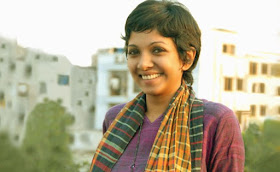Like many, the Beats, especially Allen Ginsberg#, and the Hungry Generation poets too were inspired by the wandering minstrels of Bengal, the Bauls. Goirick Brahmachari had a chance to digitally converse with Anusheh Anadil, one of the foremost Bangladeshi folk singers, on Baul music and lyrics recently. Here is an excerpt from the interview*.
 |
| Anusheh Anadil |
TSC: Why and how did you choose to become a Baul singer?
Anusheh Anadil: I don’t think of myself as a Baul singer. I am a singer who likes to sing songs that embody the present.
TSC: What is Baul? What significance does the word hold for you? What does a lost Baul bard seek?
AA: That is a question you must ask someone who calls her/himself a Baul. I personally don’t think that every single Baul bard is seeking the same thing. But I feel that while the rest of the world desperately seeks for a sense of identity, in my mind, a Baul is supposed to be the one who tries to shed her/his sense of self `.
TSC: Do all Bauls write their own songs?
AA: Once again you are asking a question that I can’t answer. My friends who call themselves Bauls don’t necessarily write their own songs. Many are followers of Lalon Shai or other great mystics and choose to sing songs passed down to them by their gurus. While others, mostly those who call themselves Boyatis, write and compose their own songs.
TSC: What is the role of women in a Baul commune?
AA: Patriarchy has spread everywhere. Even in the Baul commune, where bearded dread locked ‘men’ fail to see the women in themselves. The role of a woman cannot be defined, just as the role of a man. All of us incorporate both these energies and any commune that tries to separate the roles according to gender are only perpetuating patriarchy and not on the ‘shohoj’^ path.
TSC: How important is the travel narrative in the Baul lyrics. Do they refer to spatial travels, time travels/ reincarnation?
AA: The ‘Baul’ you seek, is too blissfully drunk on the ‘present moment’ to care much about anything else.
TSC: Help us understand Baul, the religion better? What are its basic differences with Sufism, which too gained prominence during the Bhakti movement in Medieval India/ subcontinent?
AA: A religion is a doctrine. A code of conduct. Some Bauls follow strict rituals just like those of other religions. But those are not the ‘Bauls’ who inspire me.
TSC: Most of your work surrounds around Lalon# Fakir’s lyrics. What do you think makes Lalon significant in these times of acute caste oppression`, extreme intolerance towards different views/cultures and religious fundamentalism.
AA: Some Lalon practitioners say that secularists have hijacked Lalon for their own propaganda. I will not disagree because I am one of those secularists. The world has always had extremes. It may seem like right wing politics is on the rise, but think of women not so long ago being burnt with their deceased husbands. Or the black men and women of America used as slaves to build a nation for the white man. Or a colonized India, where Indians weren’t allowed into Calcutta Club. The world is always changing. And change makes people who are unwilling to change very, very uncomfortable. Lalon’s lyrics still resonate with us, not because Lalon was willing to change, but because he was part of that Change itself.
TSC: I have been a keen follower of the band Bangla and I must share that I have heard and loved most of the albums and singles that you and other members have recorded since. How was it like to work with Arnob, Sahana, Buno, and others? How hard was it to compose a contemporary sound for a traditional style and lyrics that a Baul song embodies?
AA : They are my friends. It was never hard. It was always fun. Friends fight. So do we.
TSC: Anything else you would like to add?
AA : In this extremely complicated and twisted world, the songs of the ‘Bauls’ stand out as a breath of fresh air. You know why? Because they are simple. Shohoj^ . They are rooted in the present. While our lives are all about preparing for the future and learning from the past. The ‘Baul’ is grounded in the present. Dancing to the tune of the wind, bathing in the colors of the moon. She sees herself as the reflection of life itself. In this globalized, capitalistic world, where indigenous cultures struggle to thrive, the ‘Baul’ you seek, stands out. No matter what you call them. Not because they are seeking, but because they ARE.
_________________________
# After Lalon Shah, Allen Ginsberg : https://www.youtube.com/watch?v=y7nNpl-vejE
`Emon Manob Shomaj, Lalon: https://www.youtube.com/watch?v=683KXX3rxa4
Ami Opar Hoye Boshe Achi, Lalon : https://www.youtube.com/watch?v=RtKUfpC43Z8
^Shohoj Manush, Lalon : https://www.youtube.com/watch?v=VkVPe54wLlY
*With inputs from TSC editor Sophia Naz
No comments:
Post a Comment